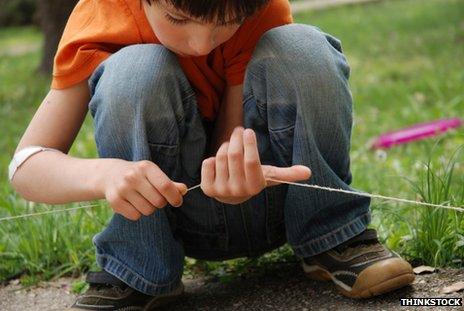Do Asbergers Kids Make Weird Animal Noises
Stimming: What autistic people do to feel calmer
Ouchlets
A series on small but meaning insights into inability
- Published
- comments
- Comments

There is a slang give-and-take that people in the autism customs utilize to describe the noises and movements they sometimes make to feel calmer. It too covers habits such equally boom-biting.
What is this word?
It'south stimming, brusque for the medical term self-stimulatory behaviours - a real mouthful.
Stimming might be rocking, head banging, repeatedly feeling textures or squealing. You'll probably take seen this in people with Autism Spectrum Disorder (ASD) but not really wanted to ask well-nigh it.
It is a term used widely in the ASD community.
Why practice people with autism stim?
There are many reasons. The earth-renowned animal behaviourist Temple Grandin is on the spectrum and says most people stim but because it feels good.
In Autism Assimilate in 2011, she said dribbling sand through her fingers was a feeling that used to calm her. Referring to her own childhood experiences, she said that stimming "may counteract an overwhelming sensory surround, or convalesce the high levels of internal feet these kids typically feel every solar day". A existent life case is that it could end sounds pain your ears.
As an developed, Grandin seems to command the sensory overload a little better but says some people need to stim to "refocus and realign their systems".
UK campaigner Robyn Steward says she relaxes her wrists and lets her easily flap up and down when she's happy or anxious. A public speaker with autism, Stewart thinks that for her, it'southward the rhythmic nature of stimming that does the pull a fast one on. "When babies don't sleep well, you put them in the car, in their car seat, and you drive well-nigh. They are lulled to sleep past the audio and the motility because they feel safe." The repetitive audio, she says, is a adept example of a stim outside of the context of autism.
Then, in short, stimming is often done to block unwanted sounds or visuals through distraction, or to bring focus. Not all noises and movement are stims - these have a purpose. Tics, for instance, are purposeless.
Is information technology just people on the autism spectrum who stim?
Bitten nails
No. Neurotypicals, or people without autism (you, maybe?), besides self-stimulate; blast bitter, hair twirling and foot borer all count as stims.
NTs, as they're known for brusque, tin can unremarkably command their stims and tend to practise ones that are considered more acceptable in public than those washed by people with autism.
There are blogs and web forums where people on the spectrum discuss stimming, compare stims and discuss public reactions.
Should stimming be stopped?
Welcome to Controversyville, come in, accept a seat.
"Repose hands" is a gentle request you might hear from teachers or parents in the United states of america encouraging children to finish stimming. The consensus between autism experts at present seems to favour not intervening unless information technology's causing harm, no matter that information technology may await a chip different or cause others to feel uncomfortable.
On the Talk Almost Autism forum, a correspondent called Claire (who is on the spectrum herself), writes: "[Stopping stims is] a bit similar 'teaching' someone who is blind non to feel things in a room to detect out where they are because nosotros don't like them putting their arms and hands out to practise so.
"It has a purpose. Stopping it in gild to make others feel meliorate seems baroque to me."
You can follow Ouch on Twitter and on Facebook
Around the BBC
Source: https://www.bbc.com/news/blogs-ouch-22771894
Posted by: parkerowle1997.blogspot.com

0 Response to "Do Asbergers Kids Make Weird Animal Noises"
Post a Comment